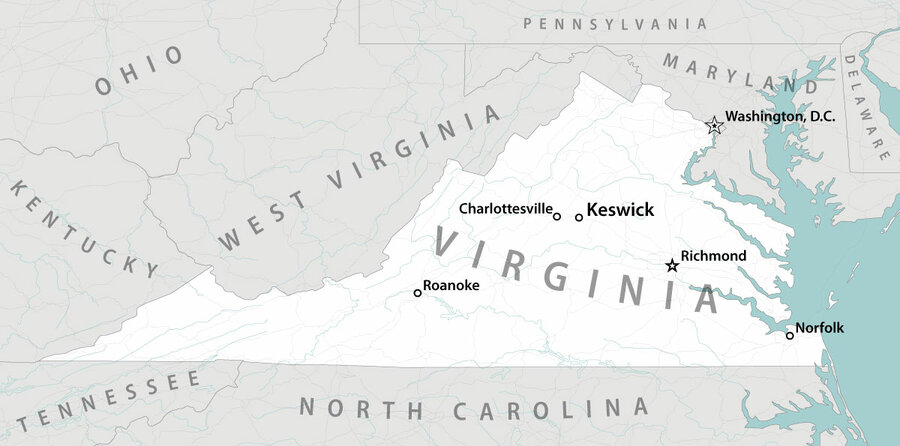If anything were to shake the faith of President Donald Trump’s supporters, it would probably be the international tariffs that have threatened a U.S. recession and pushed America’s stock market to its largest two-day loss on record. Based on the Trump administration’s own tariff calculations, prices for everyday goods – many of which may bear the brunt of the global tariff wars – are about to increase.
President Trump won a second term largely because of fears about inflation – “a kitchen table issue,” as politicians say on the campaign trail. But at one kitchen table in Keswick, Virginia, an upscale village on the outskirts of Charlottesville, a group of neighbors says they’re fine with the higher prices and the market downturn because this president long ago earned their complete trust, loyalty, and, by extension, patience.
To them, Mr. Trump is more than a party leader or even a second-term president. They say they see Mr. Trump as a disrupter and once-in-a-generation visionary – not someone bound to party politics or vacillating economic forecasts. He’ll do what he thinks is best, they explain, and that’s what’s best for America.
Why We Wrote This
Even the direst economic reports or constant talk of an impending constitutional crisis is not likely to sway President Donald Trump’s most ardent supporters, who see him as a disrupter and once-in-a-generation visionary.
“He campaigned on breaking things in order to fix them,” says Alan Janusziewicz, tapping an index finger on his kitchen countertop.
And break things President Trump has.
Slashing the federal workforce. Closing governmental agencies. Repealing environmental regulations. Stepping up deportation efforts. Banning diversity, equity, and inclusion programs; paper straws; and transgender participation in women’s sports. Announcing unprecedented tariffs and starting a global trade war. Less than three months into his second term, President Trump has surprised Democrats and Republicans alike with the breadth and speed of his actions.
Mr. Trump and his administration’s policies continue to face pointed pushback from university presidents, economists, world leaders, and judges all the way up to the U.S. Supreme Court. Many have decried his moves as chaotic and illogical, if not illegal. But like the president, many of his voters don’t seem to care. Even the direst economic reports or constant talk of an impending constitutional crisis is not likely to sway President Trump’s most ardent supporters, who say they’ve never been prouder of the man remaking the U.S. government – and, some argue, the world.
In 2016, after traveling the world as a U.S. Army doctor, Mr. Janusziewicz moved with his wife, Michelle de Stefano, to Keswick, and built their home at the foot of the Blue Ridge Mountains. One weeknight in his home, half a dozen neighbors gather to talk and graze overstuffed platters prepared by Ms. de Stefano: pastry-wrapped sausages, stuffed peppers, and grapefruit-rosemary water flavored with herbs that Ms. de Sefano grows in her greenhouse.
As they refill each other’s glasses and finish each other’s sentences, the three-time Trump voters speak of President Trump’s second term with awe. Everyone agrees it’s already going “even better” than expected.
“I love everything Trump’s doing,” says Jill Parks, a retired pharmacist.
It’s all happening “at the speed of light,” adds Jeff Pugh, who works in home improvement, nodding in agreement.
Pam, who declined to give her last name for fear of retribution at work, responds to others’ comments by bending her arm into a right angle and pumping it up and down: the universal sign for the “Trump Train.”
Just as President Trump’s vision for the country has intensified in his second stint in Washington, so, too, has his core supporters’ admiration.
“I see Trump as this heroic figure,” says Ms. de Stefano, a painter. “He really has transcended everything with that assassination attempt. He’s got a singular goal – saving this country – where I don’t think he had that in his first term. But this term, he’s got it. He’s focused like he’s never been focused.”
Unshakable support meets falling polls
In late February, Republican satisfaction with how things are going in the United States surged 58 percentage points – the largest jump in Gallup history. Short of backing and promoting another vaccine as he did during the early days of the COVID-19 pandemic, Mr. Trump could do nothing to shake their support, these Virginia neighbors say.
They love how Mr. Trump has dismissed his first administration’s “turncoats,” as Gerald Lafon, a judo coach and former Marine, puts it, and the president is now fighting back with a Cabinet of loyalists. Since taking office, Mr. Trump has targeted private law firms and fired Justice Department prosecutors involved in cases against him, revoked security clearances for disloyal Republicans and Democrats, and banned The Associated Press from White House events over a disagreement about referring to the Gulf of Mexico as the Gulf of America. They tick through Mr. Trump’s fulfillment of campaign promises such as upending the immigration system (through mass deportations) and shrinking the federal bureaucracy (through Elon Musk’s work in the newly created Department of Government Efficiency, or DOGE).
The support has endured even when Mr. Trump’s policies briefly upended Ms. de Stefano and Mr. Janusziewicz’s livelihoods. The couple own a consulting company that provides medical opinions for veteran claims within the U.S. Department of Veterans Affairs. They had one of their contracts “DOGE-d,” as Ms. de Stefano puts it. Although the contract was deemed essential and reinstated one week later, she says she supported the president and his cause even while calling her employees and giving a stop-work order.
“We understood that we were voting for a limited government and yet were a federal contracting company,” says Ms. de Stefano. “We put our money where our vote was.”
When it came to Mr. Trump’s tariff announcements, the group was unsurprised. They all remembered him repeatedly invoking the country’s trade deficit on the campaign trail. The president has touted the power of tariffs for decades.
But seeing the immediate economic consequences hit retirement savings accounts has worried some supporters. According to several early April polls, Mr. Trump’s approval rating has dropped several points from earlier this year. An Economist/YouGov poll, for example, shows Mr. Trump’s approval rating dropping 5 points from the week before, and his approval rating on jobs and the economy falling 6 points among Republican voters. In Quinnipiac University’s February poll, 49% of respondents disapproved of Mr. Trump’s handling of trade. As of April, that number has jumped to 55%.
Exploiting the economics
Given that last November’s election was “all about prices” and next year’s midterm elections probably will be as well, there’s “an opportunity for us to lean in on what we got wrong in the last election,” says Yasmin Radjy, executive director of the progressive political group Swing Left.
Rather than target Mr. Trump’s loyal base, Ms. Radjy thinks Democrats should target the “purple” voters who prioritize their bottom line. “Those are the majority-makers in any election,” she says.
Brian Seitchik, a Republican strategist who worked on Mr. Trump’s 2016 and 2020 campaigns, agrees the economy could make or break the next big election for Republicans.
“Many Americans felt the jolt of the stock market fluctuations, but that’s taking a short-term view. President Trump and his Cabinet are taking a long-term view,” says Mr. Seitchik. “Right now [Mr. Trump] has a lot of runway with the American people. … They trust that he has a plan.”
“New rules, new game, new sheriff”
And here in this Virginian kitchen are some of those loyal supporters who remain on board. Ms. Parks says Mr. Trump’s “Liberation Day” should have happened “a long time ago.” Whom should we trust to make big economic decisions, says Mr. Janusziewicz, “more than a highly successful businessman?” When asked if they are concerned about the current market volatility, the whole kitchen erupts, “No, no, no.”
“He’s doing it purposefully, to crash the market, so that it wakes up the rest of the world and says, ‘Hey, we’re not going to take this [expletive] from you anymore,” says Pam.
“These are the new rules, new game, new sheriff,” says Mr. Janusziewicz.
“It all takes time, and, unfortunately, the average American has no patience,” says Mr. Lafon, the former Marine.
They say that the stock market downturn is just another example of Mr. Trump working for the common man. Many Americans don’t own individual stocks, so the current market downturn only hurts one segment of the country, they say, adding, however, that they all own stocks themselves.
For the past decade that he’s been in and out of public office, Mr. Trump’s central appeal to supporters has been his perceived economic prowess. His willingness, until now, to prioritize low costs and shareholder returns by any means necessary is largely how he’s been able to tape together a winning coalition of both disaffected blue-collar, Midwestern workers and white-collar, old-school Republican budget hawks.
During the past three elections that Mr. Trump has been at the top of the ballot, voters across these demographics have said they aren’t crazy about Mr. Trump’s tweets or his conduct on the world stage. They vote for the New York businessman for economic reasons.
For these Virginia voters, it’s the person, not the policy, that they say drives their devotion to the president. It can feel isolating, they say, supporting Mr. Trump when he is reviled by so many. Why can’t the entire country see what they see?
“He’s one thousand percent patriotic,” says Pam. “He loves this country …”
“… He’s true to America,” adds Ms. Parks.
“He’s so passionate about this country, and he doesn’t really care whether he’s very popular,” says Pam. “He’s only focused on America.”
“And what’s good for this country,” interjects Mr. Pugh.
“And wouldn’t you say he’s really honed that down since the last election?” asks Ms. de Stefano.
“Oh yeah,” says Ms. Parks.
“What Donald Trump means to me, and I think to most of us, is somebody who is willing to say, ‘We’ve had enough of that,’” says Mr. Janusziewicz. “‘We need to do something different.’”










